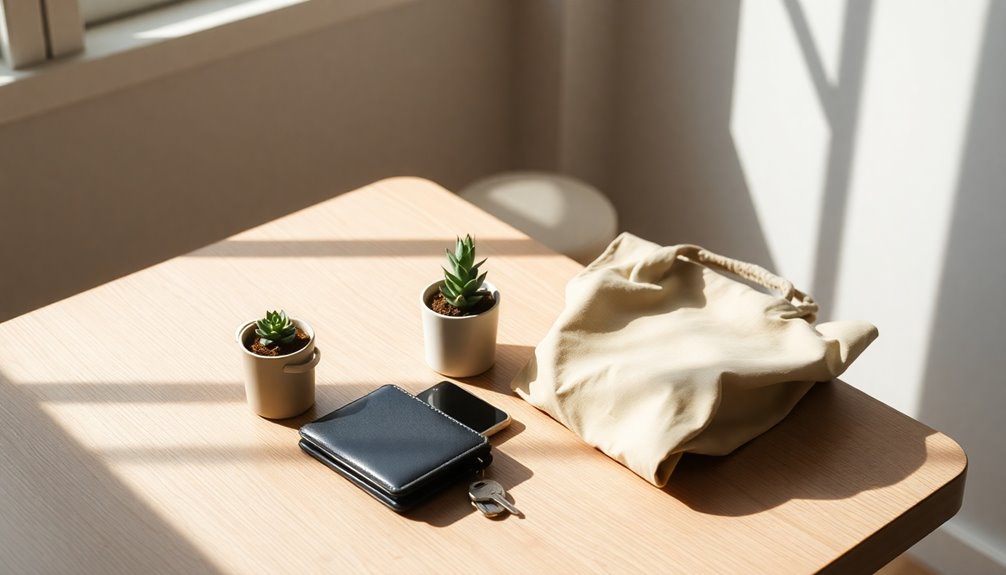Minimalist budgeting helps you save money by focusing on what you truly need and cutting out unnecessary expenses. By spending less than you earn, you can reduce clutter and financial stress, leading to greater freedom. Simple strategies like meal planning and creating a capsule wardrobe can cut hundreds from your yearly budget. Embracing this lifestyle not only helps you regain control over your finances but also enhances your overall satisfaction. Discover how it can transform your finances even further.
Key Takeaways
- Living with less reduces clutter and unnecessary expenses, leading to significant savings, potentially around $2,880 annually.
- Values-based budgeting prioritizes essential purchases aligned with personal values, enhancing financial satisfaction and reducing impulse spending.
- Meal planning and creating a capsule wardrobe can significantly lower food waste and clothing expenses, saving hundreds each year.
- Regularly reviewing and categorizing expenses helps identify non-essential spending, allowing for targeted cuts and improved financial health.
- Embracing minimalism fosters emotional clarity, promoting mindful consumption and intentional living, which ultimately leads to greater financial freedom.
Understanding Minimalist Budgeting

When you embrace minimalist budgeting, you're not just trimming your spending; you're redefining your relationship with money. This approach emphasizes spending less than your income, focusing on essential expenses while cutting out unnecessary wants.
By adopting a values-based budgeting strategy, you can identify purchases that truly matter to you, leading to significant savings and greater fulfillment.
In the U.S., average weekly spending exceeds budgeted amounts by about $143, which adds up to roughly $7,400 in overspending each year. Minimalist budgeting helps you avoid this trap, promoting fewer possessions and reducing clutter, which lowers your expenses. Additionally, the mental clarity gained from decluttering can enhance your financial decision-making, leading to more intentional spending.
Ultimately, practicing this method not only saves money but also fosters financial freedom, allowing you to aim for independence by amassing assets for a secure future.
The Philosophy Behind Minimalism

Minimalism offers a profound shift in perspective, inviting you to prioritize what truly matters in life. It emphasizes personal growth and contribution over material wealth, suggesting that a meaningful life isn't tied to income but to how you allocate your time and resources.
By managing your finances responsibly, you learn to spend less than you earn, focusing on essential needs rather than superfluous wants. Adopting this mindset encourages you to evaluate your purchases critically, weighing the freedom they provide against the effort needed to earn the money.
Furthermore, minimalism advocates for values-based budgeting, aligning your spending habits with your personal values. This approach promotes mindful consumption, ultimately enhancing your overall life satisfaction and leading to a more fulfilling existence. Embracing the elegance of simplicity helps to reinforce these principles, guiding you toward a more intentional financial journey.
Practical Budgeting Strategies for Minimalists

To make budgeting easier as a minimalist, you can focus on practical strategies like meal planning, creating a capsule wardrobe, and tracking your expenses.
These approaches help you streamline your spending, reduce waste, and guarantee that every dollar aligns with your values. Additionally, adopting a mindset of cultural intelligence can enhance your spending decisions by fostering awareness of diverse perspectives and values in your financial choices.
Let's explore how each of these strategies can boost your financial clarity and satisfaction.
Meal Planning Essentials
Meal planning is a game changer for anyone looking to streamline their budget and reduce waste. By creating a weekly meal plan, you can cut down on food waste, potentially saving up to 40% of what you'd normally toss.
This approach also helps limit dining out, which can cost an average of $4,000 annually. Consider using meal planning services like eMeals to generate tailored shopping lists, helping you avoid impulse buys and saving around $500 a year.
Implement a minimalist pantry with only essential ingredients for more intentional cooking. Planning meals around sales and seasonal produce can further maximize your budget, potentially slashing grocery bills by 25% while ensuring you eat healthily and enjoyably. Additionally, incorporating low carb high protein breakfast ideas into your meal plan can provide nutritious options that keep you energized and satisfied throughout the day.
Capsule Wardrobe Creation
When you embrace a capsule wardrobe, you're not just simplifying your closet; you're also making a smart financial choice. By curating 30-40 versatile pieces, you'll reduce decision fatigue and save money by focusing on quality over quantity.
This approach can help you save an average of $1,200 annually by avoiding impulse buys and unnecessary clothing. Start by conducting a wardrobe audit—identify your favorite items and remove anything you haven't worn in the past year.
This process promotes mindful shopping and reduces overconsumption, leading to a more sustainable lifestyle. Plus, with fewer choices, you'll discover increased creativity in your outfits, enhancing your personal style and overall satisfaction with what you wear. Additionally, embracing this minimalist approach can help you prioritize self-worth, as it encourages you to focus on what truly matters in your wardrobe and life.
Tracking Expenses Effectively
Effective expense tracking is essential for maintaining a minimalist lifestyle and achieving financial freedom. By categorizing your spending into essential and non-essential expenses, you can pinpoint areas to cut costs that don't align with your minimalist values.
Utilize budgeting apps or spreadsheets to automate the tracking process; this makes monitoring your habits easier. Review your expenses monthly to spot patterns and curb emotional spending, helping you make informed decisions.
Set specific spending limits for each category to maintain discipline and accountability. Regularly assess your tracked expenses against your personal values for a more intentional spending approach.
This leads to a greater sense of financial freedom and satisfaction in your minimalist journey while tracking expenses effectively.
Identifying and Eliminating Unnecessary Expenses

Many people overlook unnecessary expenses that silently drain their finances each month. By identifying unnecessary expenses, you can make significant changes to your budget.
Start by reviewing your past spending to spot impulse purchases or non-essential items that caused financial regret. Focus on essentials like:
- Rent and utilities
- Groceries
- Meaningful experiences over optional luxuries
Eliminating subscriptions, such as cable TV and unused gym memberships, can save you hundreds annually.
A values-based budgeting approach helps you discern necessary versus unnecessary purchases, aligning with your financial goals. Practicing mindfulness techniques can enhance your awareness of spending habits and promote better financial decisions.
Consolidating hobbies allows you to invest in fewer, higher-quality interests, reducing wasteful spending.
With these strategies, you'll free up resources and enhance your savings.
The Emotional Impact of Consumerism

Consumerism often creeps into our lives, leaving a trail of emotional stress and financial strain. You might find yourself spending an average of $340 weekly, far exceeding your budgeted $197.
This hyper-consumerism creates emotional clutter, overshadowing your happiness and financial freedom. Studies show that excessive spending doesn't lead to increased satisfaction; rather, it fosters regret over impulsive purchases.
By adopting a values-based budgeting approach, you can streamline your spending and focus on what truly matters. This shift not only lightens your financial load but also reduces emotional clutter, enhancing your overall fulfillment.
Embracing minimalism can save you significant amounts—like $2,880 a year—by curbing unnecessary expenses and helping you prioritize meaningful purchases. Regularly evaluating your mental health can also contribute to making wiser spending choices, as emotional clarity allows for more intentional living.
How Minimalism Enhances Financial Freedom

Minimalism helps you reduce impulse spending by encouraging you to think twice before making purchases.
By prioritizing essential expenses, you can focus your money on what truly matters to you.
This shift cultivates financial awareness, empowering you to make smarter choices for your future.
Reducing Impulse Spending
While it might be tempting to indulge in fleeting desires, adopting a minimalist approach to budgeting can greatly curb impulse spending. By focusing on essential needs rather than wants, you'll find it easier to resist unnecessary purchases.
Studies show that the average American overspends about $143 weekly, which minimalism aims to reduce.
Consider these strategies for reducing impulse spending:
- Evaluate each purchase against your values.
- Limit exposure to advertising and sales promotions.
- Create a waiting period before buying non-essential items.
Embracing minimalism not only minimizes clutter but fosters a mindset prioritizing meaningful purchases.
This shift leads to increased satisfaction and financial stability, ultimately enhancing your overall financial freedom.
Prioritizing Essential Expenses
When you prioritize essential expenses, you create a solid foundation for financial freedom. By identifying true survival costs—like rent, utilities, and food—you focus your resources on what really matters.
This minimalist approach can lead to significant savings, as many people overspend by an average of $143 weekly, adding up to around $7,400 annually.
Implementing a values-based budgeting strategy helps you distinguish necessary purchases from unnecessary ones, reducing financial clutter. You can eliminate impulse purchases and non-essential subscriptions, potentially saving a lot of money—approximately $139 a year on services like Amazon Prime and $2,880 on meal delivery. Additionally, practicing gentle methods for managing finances can foster a healthier relationship with money and reduce the stress associated with financial decisions.
Cultivating Financial Awareness
Focusing on essential expenses lays the groundwork for a deeper understanding of your financial habits.
By cultivating financial awareness through minimalism, you can identify and cut out unnecessary costs, saving around $7,400 annually. This approach aligns your spending with personal values, reducing financial clutter and enhancing savings.
Consider these strategies:
- Review your spending habits regularly to spot overspending.
- Limit subscriptions and avoid impulse purchases to save big.
- Embrace values-based budgeting for a sustainable lifestyle.
Each step you take promotes a mindset shift towards financial freedom.
With mindful spending, you can work towards having sufficient assets—like the target of $1.2 million—to enjoy independence without a day job.
Embrace minimalism to truly enhance your financial life.
Real-Life Examples of Minimalist Budgeting Success

As you explore the world of minimalist budgeting, you'll find inspiring real-life examples that showcase its potential for financial success. Many individuals save an average of $7,400 annually by cutting unnecessary expenses. Families embracing minimalism enjoy less clutter, meaning less time spent cleaning, translating to savings on supplies. Creating a capsule wardrobe can save you around $1,200 each year by focusing on quality over quantity. Additionally, shifting to values-based budgeting aligns your spending with personal priorities, boosting savings and fulfillment. Understanding the importance of advance directives in financial planning can further enhance your overall budgeting strategy.
| Example | Savings Per Year | Time Spent on Cleaning |
|---|---|---|
| Individual Minimalist | $7,400 | Reduced by 50% |
| Capsule Wardrobe | $1,200 | Reduced by 30% |
| Family Minimalist | Varies | Reduced by 40% |
Frequently Asked Questions
What Is the 70-10-10-10 Budget Rule?
The 70-10-10-10 budget rule is a simple way to manage your finances.
You allocate 70% of your income for living expenses, ensuring your basic needs are met.
Then, set aside 10% for savings, another 10% for debt repayment, and the last 10% for charitable giving or investments.
This balanced approach helps you prioritize essential spending while also fostering financial discipline and helping you achieve your long-term financial goals.
How to Live Minimally and Save Money?
To live minimally and save money, you've gotta focus on quality over quantity, prioritize essentials over luxuries, and embrace simplicity over excess.
Start by curating a capsule wardrobe that suits your style, meal planning to cut grocery costs, and limiting toy purchases for your kids to special occasions.
Stream your favorite shows instead of paying for cable, and practice values-based budgeting to align your spending with what truly matters to you.
What Is the 50 20 30 Rule for Minimalist Budgeting?
The 50/20/30 rule's a simple budgeting approach that divides your income into three categories.
You allocate 50% to needs like housing and utilities, 20% for savings and debt repayment, and 30% for wants.
By using this framework, you'll prioritize essential expenses while still enjoying some discretionary spending.
It helps you stay aware of your financial habits, encouraging intentional choices that align with your values and prevent overspending.
Do Minimalists Spend Less Money?
Did you know that minimalists can cut their weekly spending from $340 down to about $197?
When you embrace minimalism, you prioritize essential purchases and eliminate impulse buys. This intentional approach helps you align your spending with your values, leading to significant savings over time.
Conclusion
By embracing minimalist budgeting, you're not just cutting costs—you're trimming the excess from your life, much like a gardener pruning a tree to make room for new growth. As you shed unnecessary expenses, you'll discover a newfound freedom that allows your finances to flourish. When one family reduced their monthly spending by 30%, they found the extra cash not just in their wallets, but in the joy of experiences over things. Start your journey today and watch your life transform.









